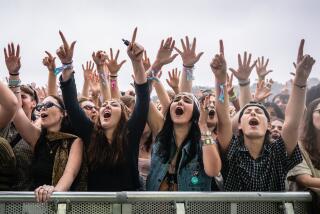S.F. Fest Samples Diverse Goods
SAN FRANCISCO â Putting together a jazz festival is not an easy task. And itâs become even more difficult during an era in which the music is not exactly blessed with iconic figures. Forty or 50 years ago, the task was far different, at a time when it was possible to put together a lineup from a pool of talent ranging from Charlie Parker, Duke Ellington and Thelonious Monk to Ella Fitzgerald, Dizzy Gillespie and Miles Davis. Todayâs major name choices are far more limited, even though the music is not lacking in overall creativity.
The San Francisco Jazz Festival, under the direction of Randall Kline, has been in the vanguard in recognizing the fact that the solution is imaginative, thematic programming. Thursday night, in the second set of presentations in the festivalâs 10-day, 27-concert run, three offerings at the San Francisco War Memorial and Performing Arts Center displayed the appealing results that such an approach can produce, even without a high-visibility headliner.
Kline believes strongly in the principle that the best music festivals have to reflect the communities in which they are taking place. Thursdayâs programs encapsulated that notion via a selection of music reaching across the Bay Areaâs spectrum of cultural diversity and sophistication.
In the Centerâs Green Room, an avant-garde encounter took place between two aggressively adventurous tenor saxophonists, Odean Pope and David Murray, working with the able support of bassist Tyrone Brown and drummer Craig McIver. Pope and Murray are masterful technicians, fully in command of their instruments both in terms of their traditional usage and in terms of their capacity to produce a wild array of sounds.
Those sounds included honks, squeals, multiphonics and slippery, vocalized expressions of the sort that many listeners would refuse to even identify as music, much less jazz. Yet many of the fundamentals of jazz were present. The music had a driving sense of swing, often energized by groove-like passages from Brown; blues inflections crept in and around the solo lines; and improvisation was ever-present.
That said, the intensity of Pope/Murray dialogue left little room for relaxation. Yet there was no question that its very intensity was a perfect reflection of at least one facet of life in this particular city, a convincing linkage to its clamor and uncertainty, to its insistence on the opportunity for individual expression, whatever its nature.
Overlapping with the Pope/Murray dialogue, an entirely different style of saxophone playing took place in the Centerâs Herbst Theater. Multi-saxophonist Harvey Wainapel and bassist John Wiitala, performing in chamber jazz style, brought a different jazz slant to the evening. Moving easily from ballads to Monk, interspersing delicate, unison passages with free-flying individual solos, they made the case for jazz as an articulate creative discipline.
Wainapel played alto, tenor and soprano saxophones, finding the individual qualities of each instrument rather than eliciting the same sounds from each. Wiitala offered counter-lines so supportive that they fully compensated for the absence of other, harmony-producing instruments. Together, they suggested other aspects of San Francisco: its pride in its cultural history, its capacity to embrace style and elegance.
The eveningâs final program offered yet another duo: violinist Regina Carter and pianist Kenny Barron. Here, craft and skill were ever-present, enhanced by a surging undercurrent of the blues.
Carter seems to improve with every appearance, and her soloing was far more visceral than in other recent appearances, further animated by her growing command of the violinâs many resources. Using double stops, harmonics and glissando slides, she added new life to a program largely devoted to the pairâs album, âFreefall.â Barron, bringing astonishing tonal color to his solos, combined with Carter to add yet another thematic facet to an evening filled with captivatingly different musical perspectives.
Unfortunately, because of the illness of headliner Etta James, the festivalâs Friday night show was postponed until November. But the festival continued Saturday with a concert featuring Rosemary Clooney and Bay Area singer Paula West. Sundayâs events reached from a San Francisco Bay brunch cruise with the Zydeco Flames and Aux Cajunais to performances by Don Byron, Bobby Short, Terry Riley, Fred Frith and others.
More to Read
The biggest entertainment stories
Get our big stories about Hollywood, film, television, music, arts, culture and more right in your inbox as soon as they publish.
You may occasionally receive promotional content from the Los Angeles Times.










